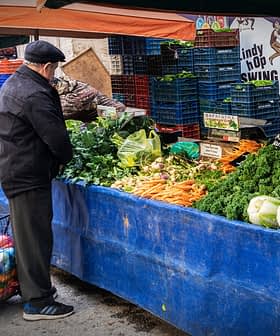“It is a fierce jungle.”
This is the vivid way Panagiotis Karantonis describes the industry he has followed for more than 25 years. He is the general manager of the Greek association of olive oil manufacturers known as ESVITE, an organization that promotes the interests of small and medium Greek olive oil companies. For its fifty plus members, the competition from abroad remains tough.
We cannot push the price lower because we are at our limits.
“The fact remains that Greece is number three behind Italy and Spain in olive oil production. Knowing this, the members of ESVITE must find effective ways to remain competitive with the goal to increase exports in key markets. To get there, we all have to work together and overcome some unique challenges.” Unique challenges that Karantonis has passionately confronted.
“When you are involved with olive oil, you fall in love with it. You start understanding its quality, its variety and then its aromas and tastes. It’s not oranges or apples, but real love. Especially for Greeks, olive oil is part of our culture, it’s real special.”
After completing two master’s degrees at the London School of Economics, Karantonis returned to Greece in the mid 1980s, working briefly in the private sector for a multinational food corporation before he transitioned into the public sector working on food policy at the Greek Ministry of Agriculture. He then took on a leading role with ESVITE when it was founded in 1986.
Today, ESVITE has grown to include some larger companies among its membership that either own mills or are involved in trading and packing extra virgin olive oil. They work closely with SEVITEL, another Greek olive oil organization consisting of larger olive oil companies that also aim to promote the interests of the Greek olive oil industry. Together they play a key role in the 300,000 tons of olive oil produced in Greece each year, one-third of which is consumed by Greeks themselves. Just how effectively the significant surplus is sold abroad is one of ESVITE’s greatest challenges, says Karantonis.
“If we are talking about a price oriented market, Greece wouldn’t have a chance to survive as an olive oil producing country.” He says one important reason is that the average size of the Greek olive grove is relatively small with a typically unleveled land structure. As a result, mechanized methods for cultivation are difficult, resulting in greater production cost compared to other countries.
“We cannot push the price lower than it is because we are at our limits. We need to concentrate on something other than price and that means pushing through, with a national effort, a well-implemented plan that has consistency and continuity,” he says.
Karantonis says that national effort means marketing Greece’s most important advantage. An asset he believes can overcome the cost increase Greece’s oil production demands. “We produce 80 percent extra virgin olive oil. This is unique world wide. Our advantage is simply: quality. We can only build upon our quality. We aim to inform and convince consumers about the superiority of our products”
Karantonis says the potential market for packed product outside of Spain, Greece and Italy world wide is 700,000 tons. “If Greece could get a 15 percent share of this market… it means at once that Greece could export 100,000 tons of packed product. That is a big step in the right direction to get our surplus sold.”
Karantonis says there is a low awareness of Greece’s excellent quality olive oils, due to lack of aggressive marketing. “We did very little in the past, especially at the appropriate time. The key to change is better marketing because there is great room for improvement in some of the target markets.”
He disappointingly notes that share figures can drop as low as near zero percent in some key markets. He cites Japan as a good example of dismal results. Out of the 30,000-ton market there, Greece may sell 100 – 200 tons a year.
“Maybe it is egoistic to say we produce the best quality olive oil but people who know olive oil and know the industry would agree with this. After all, Italians know why they buy Greek olive oil. They wouldn’t if it were not the best. Karantonis says Greek olive oil holds exceptional organoleptic properties that he says need to be better emphasized by his organization.
“I love what I do. It’s such a special product for Greece so over the past quarter of a century ESVITE has worked hard to do more to sell Greek olive oil abroad, to give it the standing it deserves. We could do so much more still. I believe we will.”









